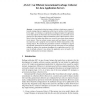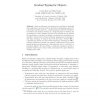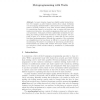101
Voted
ECOOP
2007
Springer
15 years 6 months ago
2007
Springer
Tools that perform refactoring are currently under-utilized by programmers. As more advanced refactoring tools are designed, a great chasm widens between how the tools must be use...
140
Voted
ECOOP
2007
Springer
15 years 6 months ago
2007
Springer
In this chapter, we explore the emerging research domain of modeldriven software refactoring. Program refactoring is a proven technique that aims at improving the quality of sourc...
101
click to vote
ECOOP
2007
Springer
15 years 6 months ago
2007
Springer
Java(X) is a framework for type refinement. It extends Java's type language with annotations drawn from an algebra X and structural subtyping in terms of the annotations. Each...
112
Voted
ECOOP
2007
Springer
15 years 6 months ago
2007
Springer
Abstract. A generational collection strategy utilizing a single nursery cannot efficiently manage objects in application servers due to variance in their lifespans. In this paper, ...
127
Voted
ECOOP
2007
Springer
15 years 6 months ago
2007
Springer
Object invariants describe the consistency of object states, and are crucial for reasoning about the correctness of object-oriented programs. However, reasoning about object invari...
118
Voted
ECOOP
2007
Springer
15 years 6 months ago
2007
Springer
Abstract. We present Shekoosh, a novel framework for constraint-based generation of structurally complex inputs of large sizes. Given a Java predicate that represents the desired s...
117
Voted
ECOOP
2007
Springer
15 years 6 months ago
2007
Springer
With the advent of Java 5 annotations, we note a marked increase in the availability of tools that can statically detect potential null dereferences. For such tools to be truly eff...
100
Voted
ECOOP
2007
Springer
15 years 9 months ago
2007
Springer
Static and dynamic type systems have well-known strengths and weaknesses. In previous work we developed a gradual type system for a functional calculus named λ? →. Gradual typin...
125
Voted
ECOOP
2007
Springer
15 years 9 months ago
2007
Springer
Service Oriented Architecture (SOA) promotes the utilization of available services to develop completely new applications in a context which has not been foreseen as these services...
102
Voted
ECOOP
2007
Springer
15 years 9 months ago
2007
Springer
Abstract. In many domains, classes have highly regular internal structure. For example, so-called business objects often contain boilerplate code for mapping database fields to cl...



